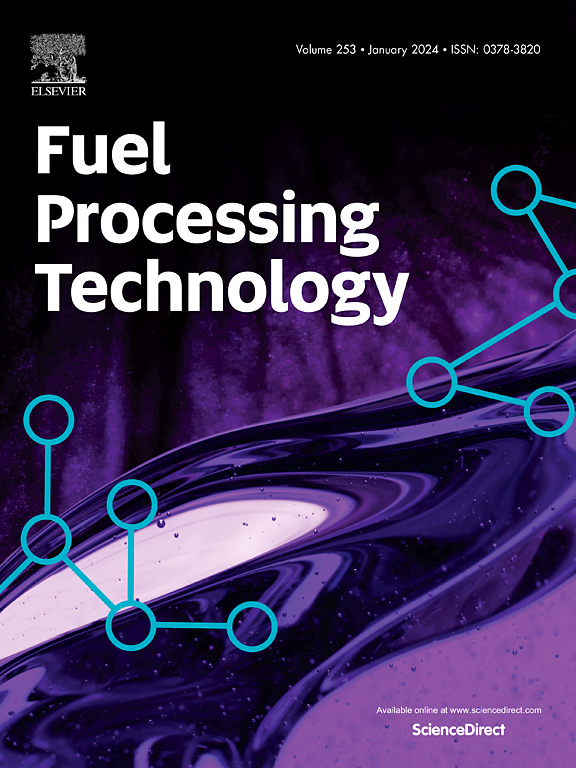Palm oil deoxygenation with glycerol as a hydrogen donor for renewable fuel production using nickel-molybdenum catalysts: The effect of support
IF 7.2
2区 工程技术
Q1 CHEMISTRY, APPLIED
引用次数: 0
Abstract
Palm oil, one of the most widely used vegetable oils, offers significant potential as a sustainable feedstock for biofuel production. This study explores the deoxygenation of palm oil using glycerol as a hydrogen donor, with nickel‑molybdenum (NiMo) catalysts supported on commercial alumina (Al2O3), and zeolite (HZSM-5) comparing with self-prepared zirconia (ZrO2). The catalysts were synthesized via incipient wetness impregnation and evaluated for their performance in biofuel production. NiMo/Al2O3 exhibited the lowest oxygen removal efficiency (68.5 %), while NiMo/HZSM-5 achieved a higher oxygen removal (74.3 %) but also demonstrated the highest coke formation. The type of support material influenced the resulting biofuel range, with NiMo/HZSM-5 and NiMo/ZrO2 favoring jet fuel production, whereas NiMo/Al2O3 was more suitable for diesel production. Notably, NiMo/ZrO2 exhibited the highest performance in palm oil deoxygenation while minimizing coke formation. These findings highlight NiMo/ZrO2 as a promising catalyst for efficient and stable biofuel production, with the support material significantly influencing product yield and fuel quality.
棕榈油以甘油为供氢体的可再生燃料生产用镍钼催化剂的脱氧:支持效果
棕榈油是应用最广泛的植物油之一,作为生物燃料生产的可持续原料具有巨大潜力。本研究探讨了以甘油为氢供体的棕榈油脱氧,用镍钼(NiMo)催化剂负载在商业氧化铝(Al2O3)和沸石(HZSM-5)上,并与自制的氧化锆(ZrO2)进行比较。采用初湿浸渍法制备了催化剂,并对其在生物燃料生产中的性能进行了评价。NiMo/Al2O3的除氧效率最低(68.5%),而NiMo/HZSM-5的除氧效率较高(74.3%),但结焦率最高。载体材料的类型影响了所得生物燃料的范围,其中NiMo/HZSM-5和NiMo/ZrO2有利于喷气燃料生产,而NiMo/Al2O3更适合柴油生产。值得注意的是,NiMo/ZrO2在棕榈油脱氧中表现出最高的性能,同时最大限度地减少了焦的形成。这些发现突出了NiMo/ZrO2作为高效稳定的生物燃料生产催化剂的前景,支撑材料对产品产量和燃料质量有显著影响。
本文章由计算机程序翻译,如有差异,请以英文原文为准。
求助全文
约1分钟内获得全文
求助全文
来源期刊

Fuel Processing Technology
工程技术-工程:化工
CiteScore
13.20
自引率
9.30%
发文量
398
审稿时长
26 days
期刊介绍:
Fuel Processing Technology (FPT) deals with the scientific and technological aspects of converting fossil and renewable resources to clean fuels, value-added chemicals, fuel-related advanced carbon materials and by-products. In addition to the traditional non-nuclear fossil fuels, biomass and wastes, papers on the integration of renewables such as solar and wind energy and energy storage into the fuel processing processes, as well as papers on the production and conversion of non-carbon-containing fuels such as hydrogen and ammonia, are also welcome. While chemical conversion is emphasized, papers on advanced physical conversion processes are also considered for publication in FPT. Papers on the fundamental aspects of fuel structure and properties will also be considered.
 求助内容:
求助内容: 应助结果提醒方式:
应助结果提醒方式:


